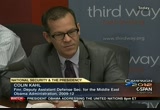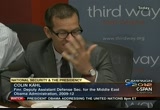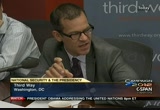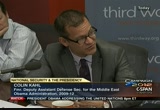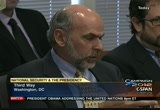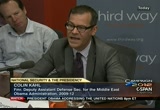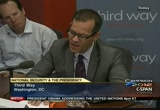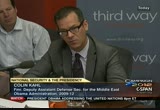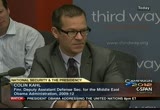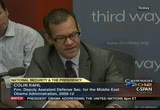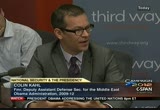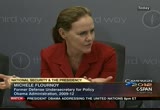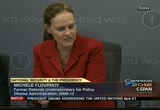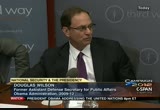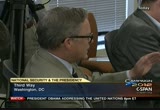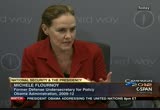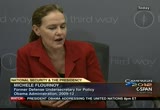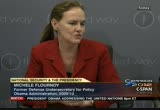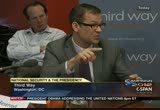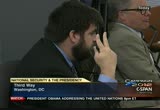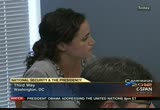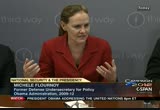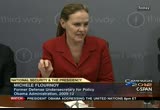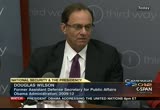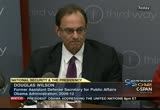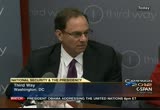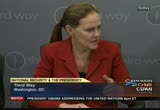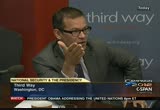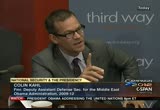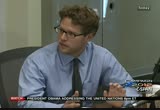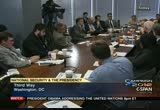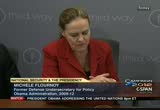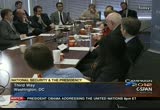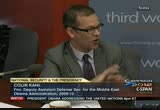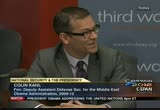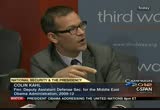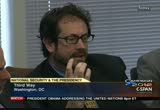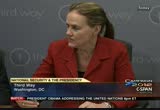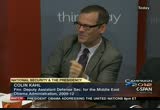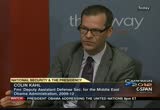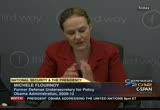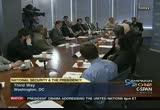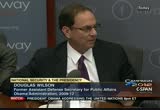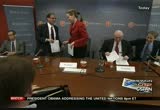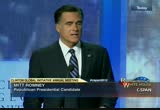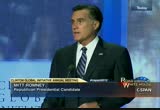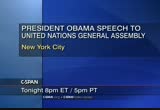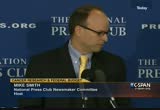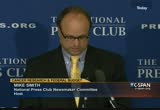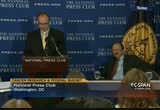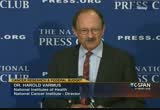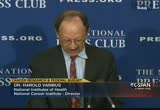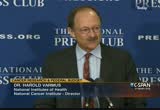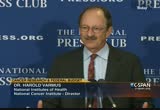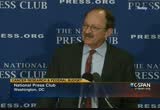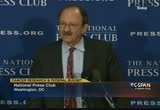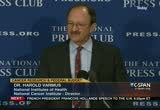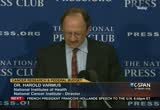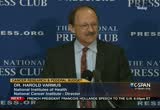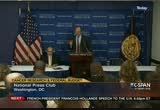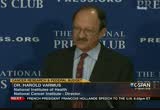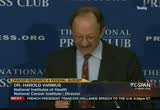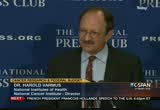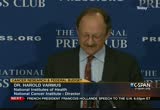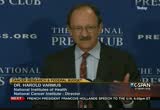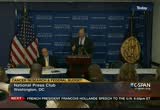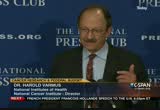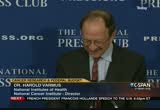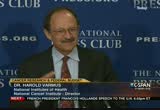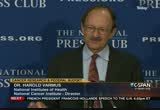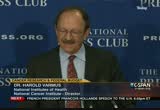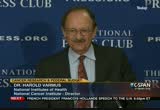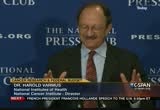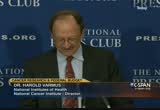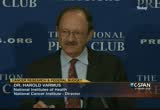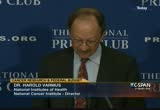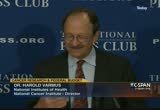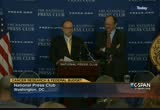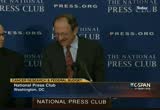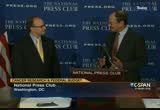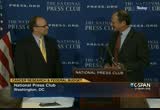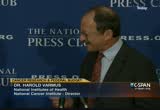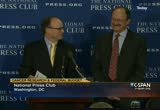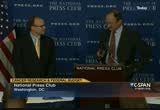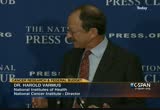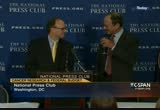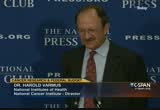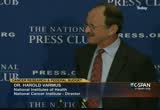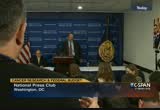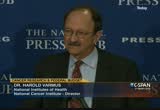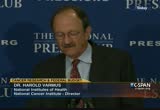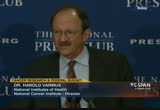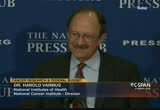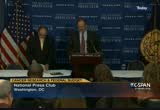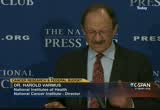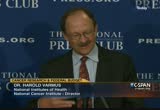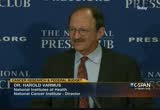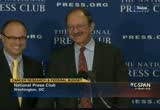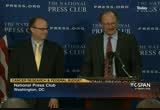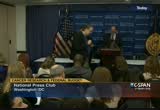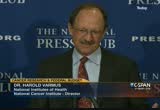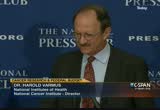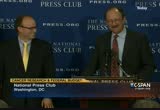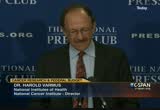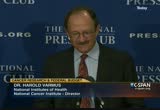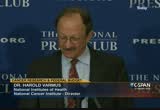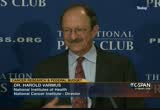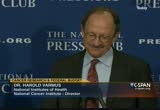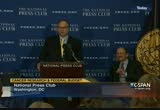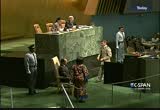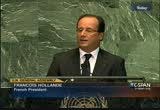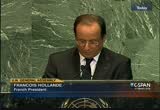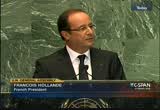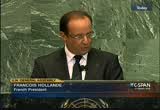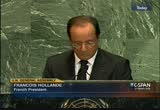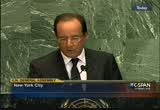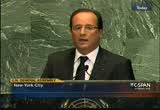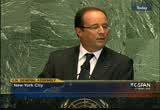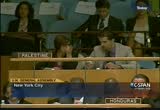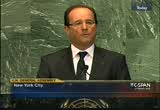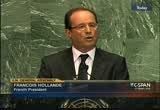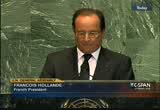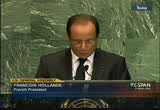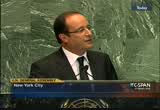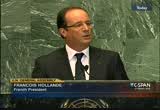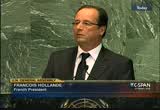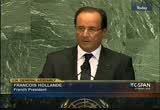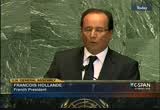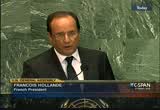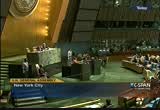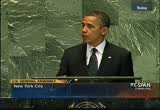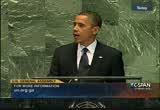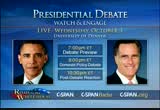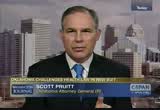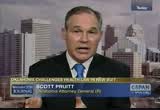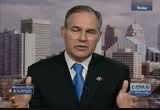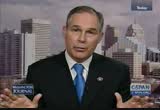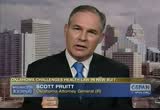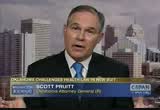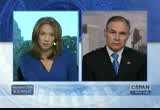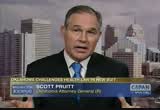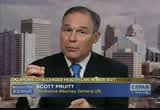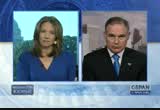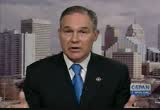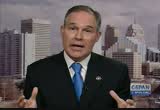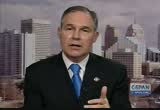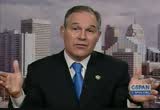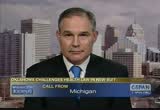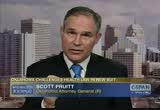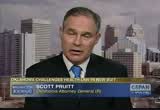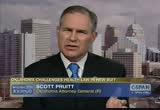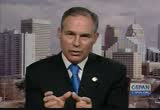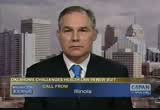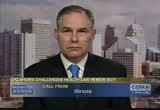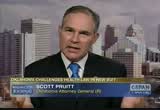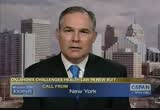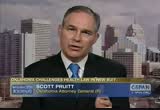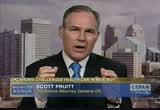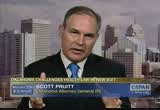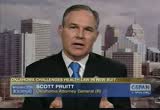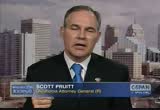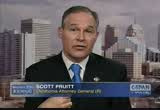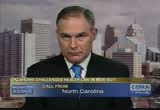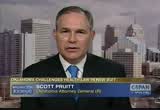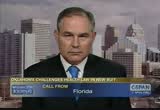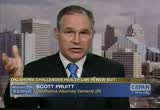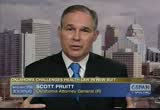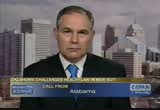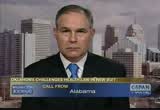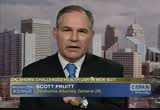tv U.S. House of Representatives CSPAN September 25, 2012 5:00pm-8:00pm EDT
5:00 pm
our policy was to asia, libya, and elsewhere had to be modified based on the situation on the ground and also in understanding how best to promote reform while preserving american interests in this part of the world. i think it is important that the president never suggested, nor do i think anybody that steady democratization of the world suggested this would be an instantaneous transformation of a region that experienced decades of turmoil and dictatorship, that there would instantly become this kind of piece-loving place. it would take longer in some places than others. there be times of violence. we have seen in the last couple of weeks that this is an environment where there is still opportunity for extremist to make trouble. i should point out that our friends on the other side of out
5:01 pm
like to imagine that if they were in charge, we would be so tough that everyone would understand where we stood and would not be able to protest against us. it is worth noting that the last time these folks were in charge during the george bush administration, there were attacks on u.s. embassies and consulates. it is important to remember that during the reagan administration, there was an attack in which killed americans. these folks let us into the most disastrous for a policy decision in a generation. it in power in iran. it killed more than 4000 americans. it left hundreds of thousands of iraqis dead or displaced.
5:02 pm
but these folks want us to hand over the keys of foreign policy back to them? the nerve of the individuals " put attention to the worst farm policy disaster and say that the understand the region better is laughable. >> you mentioned syria. there is a lot of pressure for the administration to get involved in syria. how do you think they are or should be responding? >> it is interesting. if you peel away governor romney's position, there is not a lot of different speech in him and president obama. both iran and obama believe in supporting the opposition. the administration -- but romney and obama believe in supporting the opposition.
5:03 pm
i think this administration has recognized that the most important thing we can do is create a unified political opposition so that the when the sovereign regime falls, we will have a transition as soon as possible. without a clear exit strategy, which by the way it romney said it is how he would think about military affairs, the president understands we need to keep all options on the table and be cautious about it. there are many ways to make the situation worse, rather than better. we want to get the diplomatic contacts read so that there can be a smooth transition while also -- diplomatic context so that there can be a switcsmooth transition. this administration has been at the forefront on putting pressures on the regime. i am not sure that romney will
5:04 pm
read position is that much different. >> i will open it up to questions from the press. >> one of the country that was mentioned was -- i guess the question i have is, if obama has a second term, how long could to go before you had to make a decision about whether sanctions are doing the job? i am wondering how long before a reckoning has to be made if the current policy is not working? >> i think the president has put down a very clear marker. on his watch, they cannot launch a nuclear weapon. he will reiterate that at the united nations today. all options remain on the table
5:05 pm
to include military force to achieve that our objective. governor romney sometimes has the same approach and sometimes has a different approach. he has been asked if his red line would be the same. he has said, yes. at other times, his red line has been he wouldn't let them out to get a nuclear capability. if a nuclear to the ability means having the means to produce a device, the intelligence community would say that they already have. it would take them one are to the more years to achieve that objective, but to have all the technical know how to activate it. they are ready across that probability.
5:06 pm
he should let the american people in on that. if the other argument is -- i do not think that is where romney is -- if they think have a weapon, in that case, at his red line is the same as the president's. mitt romney and has basically described the current policy as criticism. you asked how long we have. it is important to remember that iran is not on the brink of having a nuclear weapon. they have made clear progress. they are accumulating uranium at certain levels, but it was still take them at least one year to develop a nuclear device. that is likely to remain the case for some time to come. more importantly, for them to make such a move toward a device
5:07 pm
could be detected. the only way they can generate material for a nuclear device is t facilities that as are under inspection. they would get caught in plenty of time and giving americans and others to respond. we will not be caught with our pants down on us. we still have time to achieve a diplomatic outcome and let the sanctions soak in. we can find a peaceful way out of this before rushing into another war in the middle east. >> let me follow that up. the israeli government, the prime minister, at least, has challenged the united states to define a red line or else is would be able to act on its
5:08 pm
own without clearing anything with the united states. this sounds to me like an ultimatum. is that what it was? was a governnt of israel giving us an ultimatum? was that wise? >> look, israel was in my portfolio. i have traveled there 13 times. i have had hundreds of meetings with israeli officials. we are in lock step with them on how far iran is toward getting a nuclear weapon capability. we are in step with them on the objective of preventing iran from getting a nuclear weapon. they do not have the same military capability of the united states has. they do not believe they can wait as long as we can. we need to work together to
5:09 pm
align our clocks. president netanyahu is expressing concerns. the president shares those concerns. it is a huge threat to israel and the interest of the united states. this president has made clear that all options will be considered to address that. the current israeli government would like the u.s. government to put down clear markers, but there is understandable reason why no president regardless of party would lock himself or herself into a timeline of six months or eight months to go to war. you want to reserve that flexibility. our time line and is really time i might not be identical. we need to continue to have that conversation to align the two perspectives.
5:10 pm
president netanyahu has not put down his on timeline either. he has not suggested were his red line would be either. there is still time to have a question with the isrealis -- conversation with isrealis on this. we have a closer security and intelligent relationship with isrealis and now than any time in the past. we will be able to align our positions and moving forward so that we can advance a policy that is in the best interests of both our countries. >> i think this president has made an intense and ongoing effort to have a very candid and transparent dialogue with israel on the question of iran. i think both sides understand, both partners understand the positions.
5:11 pm
we have of their back. when you look at the administration's commitment to the state of israel, it is at historically high levels. when the president as a senator visited israel and saw the damage, he initiated a system that is now shooting down the% of the missiles coming. every diplomatic opportunity in terms of security assistance, he has sent the message with action, israel, we are committed to your security. and so forth. the issue here is if it ever
5:12 pm
comes to a point where we need to use military force against the rain in the program, it really matters how it is done. any use of military force is only a delay tactic. it sets back the program two buyers or three years if we are lucky. it does not solve the problem. -- it sets back the program two years or three years if we are lucky. it does not solve the problem. that really matters. that is part of the reason why we have had such an intensive
5:13 pm
discussion with isreali and other partners that are involved in helping with the sanctions to try to keep this unity together for the long term. >> you called me the political one. after romney's trip to israel and all the statements that had been made trying to describe what life is like between israel and the united states under obama, i enjoyed reading what a woman over there thought and she said, he is just pandering to us. >> you're talking about sequestration. we have speakers on the hill who are kicking cans down the road.
5:14 pm
iran and afghanistan. this administration -- we are taking our forces out by 2014. some people in military say that it is premature. along the same way with iran, people talk about the red lines but if they are the color of a jacket. you can see them. i can remember us in north korea were they had a separate program. cowrie take action if we want to? >> with regard -- can we take
5:15 pm
action if we want to? >> with regard to iraq, there is a pretty strong level of confidence that we have a good handle on the program. with that said, there is always potential for surprises. what this president has insured is that we have taken the necessary preparatory steps so that the options are real. they are ready. i can tell you that when he talks about the military option being available, he is not bluffing. it is a very real option. it has been planned and rehearsed. it is there for the current president of the future president to use. that is the insurance against being surprised, if you will. at this point we have a pretty good handle on where this
5:16 pm
program is headed. if i could take up your point on afghanistan, we do have a transition plan on afghanistan. that is being increased by the afghans and by all of our 49 partners, in nato and otherwise, who are on the ground with us over there. it is not in 2014 we are going to abandon afghanistan. we have signed a strategic partnership with afghanistan. we envision a residual force that will be able to continue to work at them on counter- terrorism on the borders where they continue to get security challenges from al qaeda and affiliates. the importance of setting at transition date was wise in the sense that we had to avoid a long term dependency growing
5:17 pm
around an indefinite commitment. the afghans wanted a transition date. they wanted to know a time line when they would step up and take responsibility and have the lead for the sake of their own population under own politics and own internal dynamics. having a transition timeline that puts them in the lead with the commitment that we will continue to provide supports that they are successful in the long term, that is the best way over there. >> on month political point -- on one political point, finally -- there is no country that received more attention in terms of looking at what it is doing then iran. you're right that we have been
5:18 pm
surprised in the past, but the intelligence community are pretty sure that we understand the program. we would detect a nuclear breakout. we would not need years. we would need months. we are ready to go in that event. the administration feels it is in good shape. if they have a parallel program that no one knows about, it does not detected by us or the israelis, the have this entire secret thing that is off the grid, bombing their overhead facilities does not solve the problem. if you do not know where the toe bitarget is, is hitting other things does not solve the problem.thin i know that there are some hawks on the right that want to rush to war, but i'd like them to
5:19 pm
explain if you do not know where that target is, how can you pick them? >> it is the unknown. >> any military attack would only delay in not end the nuclear program -- and not end the nuclear program. you can use nuclear-weapons to take out the sights and their regimes. at what point does that become a viable option? >> that is is an area that is highly unlikely. i do not think we would get to a point where the chief said they had no option option but nuclear option. >> does it definitely get on the table? >> i do not think that is in the
5:20 pm
listed scenario. i did not want to speculate on it. >> why day think afghanistan has played a non-role in the presidential -- why do you think afghanistan has played in non- role in the presidential election? [indiscernible] >> i do not think afghanistan has been forgotten. it certainly was not forgotten by the president. he talks about it. he talked about it even at the convention. it is not a politically popular, about winning topic. there is a certain commander in chief past that any presidential
5:21 pm
candidate has to pass. we talk about how this is an election about the economy. when americans go into the voting booths, the have deuce am id themselves, and i comsm i comfortable with having this president as commander in chief? mitt romney did not mention it. it was the first time a candidate for president office has not mentioned the ongoing war as part of his political speech to the american people. it is very curious. one of the reasons it is not a bigger issue is that the president has articulated a clear plan. we have 49 other countries, plus
5:22 pm
the afghans, who have gone into the plan. ultimately, the american people do want to see a transition and what to see the end of the decade of war and the end of thousands of americans being in harm's way. that has significantly reduced the risk that afghanistan poses to our vital interests. i think americans understand where we are and that they are generally supportive of the president's policy in this regard. >> i don't think there is a connection between the votes and our policy in afghanistan. i think traditionally republican have enjoyed an advantage, politically, among veterans.
5:23 pm
i think there is a growing number of younger veterans coming to the battlefield and military families and spouses who understand that this country is going to be faced with a challenge it has not even begun to address, which is the re- integration of men and women in uniform going back into communities. they have stepped up to the plate. they have provided benefits for spouses, including portable licenses so that it takes much less time for spouses when the move around to get licenses. dr. jill biden will be involved very shortly in announcing programs that will help teachers help kids of military families better adapt in schools. i think there has been tangible
5:24 pm
demonstrations by this administration with regard to veterans. that is starting to be recognized. one final thing about veterans -- we have seen at governor romney make a very sweeping rhetorical statements. we will spend trillions of dollars on the fence at the same time he is calling for 20% reduction in spending that will affect veterans programs. at some point, people see the real economics of that, and that includes veterans. >> question over here. >> there has been a reputation for democrats on defense. it is 30 years in the making. we have now reached the point of what that survey showed. i am wondering about the romney administration attacking the president and showing that he is fumbling on events. i think they pick the ambassador
5:25 pm
of's murder in libya and the protests around the world against the u.s., all trying to show that the president is fumbling. do you think that is a successful argument? it is all happening right now shortly before the election. >> every poll that has been taken have shown a substantial advantage for this president when it comes to the question of regarding commander in chief. i do not think that has changed even in the most recent polls. i think the democrats understand that you can be secure and you can be smart about it. spending does not have to do with millions, but how you spend a smartly. this administration has assembled military and civilians
5:26 pm
to deal with mandated cuts and did so by tying it to strategy as opposed to reversing it. i do not see that the argument is getting traction at all. i think it has ended up firing -- backfiring on running. -- on romney. >> he has been on the defensive because of his missteps and the bloopers, the "shoot before comments.im" getting the facts wrong and inserting himself in a way that most people found distasteful, if not embarrassing for him. when you're on that defense, you should try to change the subject. go back to the old playbook.
5:27 pm
try to make that democrats sound weak on defense. with that said, look at the polls and the american people are not buying it. >> we know from a secret tape at that fund raiser in made that he was asked about the hostage crisis in iran. he said, look, i will exploit these events as a get closer to the election. he is trying to change the subject. he is trying to politicize things. when he gets called out of bed, his book is called "no apology." maybe his book should be called "and capable of apology." -- "incapable of apology." the reality is, all of the
5:28 pm
places you have seen on rest, it has been the minority of people protesting. it has not been the majority of. -- it does not been the majority . it is the fundamental point. the strategicfor mode of the new egypt. he had a very frank conversation with president more si. calling out on the violence. making sure day kept up to their commitments to make civilians safe. that is how you govern.
5:29 pm
you did not govern 15 seconds after an event and a fire before aiming. appearing tough does not mean that you get good results. >> let me ask you one question. why do not end the war in afghanistan right now? [no audio] today in the times, there has been assumptions about the transition in the middle east. >> it seems there is a political vulnerability.
5:30 pm
maybe something more than that. if the romney team had not put their foot in the mouth about libya, we might your stronger -- hear stronger about islamist democracy in. is that a concern? is that something to think about going forward? >> on afghanistan, our strategic objective is to make sure that afghanistan is never again a safe haven for al qaeda to attack our homeland. if that is their objective, you have to make sure that the pace of the transition is driven by the ability of the afghans to stepup, stand, and take the lead with our continued support. i would fundamentally disagree with the statement that the training program is in shambles. it is not. the afghans are in the lead for
5:31 pm
more than half the country. they are doing a remarkable, find a job. -- fine job. we have had thousands of interactions with afghan forces. these occasional green on blue violent incidents of afghans firing against militia forces fractions of 1%., they also a sign, i believe, in desperation. the taliban has not been able to regain territories and hold it. they have been losing influence. this is a change of tactics to try to break the will of the coalition.
5:32 pm
in many cases, these are not taliban involved. there is disgruntled -- lots of different explanations. it is very upsetting when these things happen, but they are a tiny, tiny fraction of percentage of the overall interactions that for happening which are keeping us on track toward the transition timeline. >> i think we need to be cautious about overlearning from any of these incidents. we do not have enough distance an understanding of the bands that occurred and to draw conclusions. what i would question is the assumption on the other side that somehow they completely understand this complex reality in a way that is somehow immune from understanding of democrats. had they been in charge, things would have been fine. it is not clear what the
5:33 pm
criticism is. they believe we have not stood up and up for our values in places like egypt. others say that we have not -- done too much. at the end of the day, look at the scary place. if the republicans were in charge, all of these fears would go away. there is no substance to this argument. as the arabs bring emerged in places like egypt, clearly do republicans think we should be leading on these issues. of course, that is what the president did. he wants to be on the right side of history. people were taken to the streets and demanding the same freedoms that we enjoy.
5:34 pm
had we not supported this, a couple of things would have happened. we could not have kept mubarak if we wanted to. it would have been longer and more bloodier. we encourage him to step aside. the alternative would have been much more lager and violent. the government that would have emerged would have been even more anti-american. the president understood the importance of being on the right side of history in places like egypt and tunisia. >> what about syria? >> let's get back to this serious situation. there is a course of principles in which have to look at each country in its own terms. this is a region that is
5:35 pm
reconciling among its people for a more democratic government and the culture of islam. this is not new. how be mailed elements of islam must ---- trend over the next decade or so will be moderation. he may not agree with us, he still says he was to be friends with the united states. he cares very much about the international opinion toward the muslim brotherhood. they care about tourism and aid. the have to start to moderate their position both domestically and internationally. over time, it is not about the
5:36 pm
ones who are throwing molotov cocktails in the street. it to be brought more moderate parties -- will be about more moderate parties. it will take time. let's keep everything in perspective. >> one last question over year. >> on energy security, i think over the last 70 years, every president and every candidate has said that energy security our energy dependence will have an importance. look what the critics are saying. they are saying that the u.s. government has a cohesive energy security policy. by that, i mean energy independence. no one has articulate what that is. in terms of energy security, is that a fair criticism, especially of the obama
5:37 pm
administration? if so, what is the policy? how does it differ from that romney administration? >> i do not think that is an accurate criticism. look at the administration's's policy. the president has tried to reduce our dependence on foreign sources. we are focusing on producing energy sources at home and clean energy as well. at the same time, he has worked with auto industry to try to increase the " requirement for mileage. he has tried to put in place incentives for other kinds of conservation and so forth. what is lacking is a national .onventionconsensus capitol hill has not agreed on a consensus. i think the president has been
5:38 pm
very clear and laying out what he thinks that package to look like. there is a certain coherence to all of the piece parts. >> there is less dependence on foreign oil not done when he started. there is a reduction in carbon emissions, greenhouse gases. >> this is another area where romney has borrowed the president of's line in all of the above approach to energy independence. all analysts say we will be an energy independence by 2020. the distinction -- the current administration has emote coherent view. will have to balance the requirements of making sure we are energy independence with requirements to reduce the
5:39 pm
pollutants and the greenhouse gases that are threatening the planet. that balanced approach does not set the price energy independent or the environment. that is a distinction. mitt romney does not believe in global warming. it is not relevant to talk about renewable energy. >> i want to talk about a word -- which country do you see as the greatest threat to the united states? is there a legitimate debate about china? >> i think the rise of china in asia pacific is one of the most important developments that will happen over the coming decade. it is one of the reasons why been the president wanted to put emphasis on asia pacific. china is rising. india is rising. american jobs act will drive so
5:40 pm
much of our economic prosperity in the future. -- the asia pacific will drive so much of our economic prosperity in the future. adobe important for us to find areas of cooperation with china, as this -- it will be important for us to find areas of cooperation with china, as this administration has done. their important is to recognize that there will be areas of difference. there'll be areas of competition. we will have very tough and canned and crustaceans with chinese officials about that -- and cadid conversations -- candid conversations with chinese officials about that.
5:41 pm
the complexity of the relationship and the balance with which we have to pursue our interest with regard to that relationship, it is tough talk without fully appreciating the nuance bus policy to protect -- nuance policy to protect our interests. >> foreign policy as a matter of. there are no absolutes. there is no immediate results. why are the democrats this time chosen are republicans repeatedly? there is an understanding that this is a new world.
5:42 pm
this is a 21st century. the kind of a problem that we are facing with rising powers, all of these require more complex understandings in a number of tools that we have and not just absolute, and ideological, let's go in and bomb iran. i think people understand that distinction. that is why you are seeing this reflected in the answer of commander in chief question. >> thank you. i want to thank you our -- for answering some questions. there is something happening in the campaign that is worth noting. this is the first time ever i have seen of the countries openly taking sides of the american candidates.
5:43 pm
isreal -- russia and china have expressed preference for obama. our political polarization is catching. the disease is spreading. thank you. we will meet again before the election, i think. thank you for coming. we appreciate it. >> with that you did a great job. -- thought you did a great job. [laughter] [captioning performed by national captioning institute] [captions copyright national cable satellite corp. 2012] >> of more camp in 2012 covered, up this week on c-span with two debates from two races in the u.s. senate. that is at 11:00 p.m. eastern, live on c-span and online at c- span.org.
5:44 pm
on friday, the debate at 9:00 p.m. eastern. he served as wisconsin and governor and she has represented the wisconsin second district since 1999. >> for american foreign aid to become more effective, it has got to embrace the principles that you see in these global initiatives. the power of partnerships, access for the trans primitive nature of free enterprise, and the leverage -- tranformative nature of free enterprise, and the leverage of the private sector. first, address humanitarian need, such is the case for -- millions are suffering from hiv and aids. second, foster a strategic
5:45 pm
interest. perhaps it is military, diplomatic, or economic. third, there is another purpose that i think needs more attention and priority in the romney administration. that is aid that elevates the people and brings about lasting change in communities and nations. here is an example. a lot of americans are troubled by developments in the middle east. syria has witnessed the killing of tens of thousands of people. the president of egypt is a member of the muslim brotherhood. our ambassador to libya was assassinated in a terrorist attack. iran is moving to nuclear weapon capability. we somehow feel we are at the mercy of events rather than shaping events. i am often asked, why? what can we do about it to lead the middle east to stability and
5:46 pm
ease of that anger and hate over there and the violence? obviously extremas some is part of a problem, but that is not the whole story. the population is very young particularly in comparison with the population of developed nations. a lot of these young people do not have a lot of job prospects. the levels of youth unemployment across the region are excessive and chronic. and nation that had undergone a change in leadership recently, young people hubbard access to information. in the past, that was being carefully guarded by tyrants and dictators, but now it is available. they see the good as well as the bad surrounding societies. they can now organized across vast regions and mobilize populations. idle, crushed by a party, their
5:47 pm
frustration and anger grows. -- poverty, their frustration and anger grows. foreign aid must also play a role. >> you can watch all of mitt romney a's speech on c-span at 8:30 p.m. eastern. before that, president obama at the united nations. he spoke about the killing of four americans in libya. the national institutes of health budget could be cut by 8% as a result of automatic spending cuts scheduled for january. the head of the national cancer institute says that you as research could fall behind europe and asia as a result in cuts. he spoke at the national press club today in washington. >> good morning, everyone. welcome to the national press
5:48 pm
club warning newsmaker program. i will be the moderator for today. i have my own public affairs firm. it has been a pleasure to work with the national cancer institute to bring in our guest. we are very lucky to have him. we will be talking about, of course, cancer and our ability to cure cancer. i will introduce the doctor, but give you some ground rules first. he will speak for about 15 or 20 minutes. at the end of that, we would like to have questions. we asked reporters to go first. i will repeat the question and we will identify your news outlet. anyone from other groups that would like to ask a question, please do. over the past 40 years, we have spent millions of dollars on research to study and help find
5:49 pm
a cure for cancer. according to the most recent analyses, an average of over 1% per year -- children death rate has been in decline since the 1970's. we look for new ways for drugs to target the genetic damage. then hear the biological properties of tumors and the difficulty of developing new ways to treat cancers and economic and social factors that slow research efforts. our speaker today is code recipient of the nobel prize for studies in the genetic basis of cancer. he was nominated as president obama as director of the national institute in 2010. he became his tenure as
5:50 pm
director in 2012. in 1993, he was named by president clinton to serve as director of nih. he initiated many changes in research programs and recruited new leaders for many of the important positions and helped to initiate the budget. he majored in english literature at the same it islege where my thdaughter studying. he worked as a medical student in hospitals. he began his scientific training at nih or is steadied -- where he studied bacteria.
5:51 pm
it is our pleasure to introduce him. [applause] >> thank you for the invitation. thank you for coming. i do not say that lightly. i was invited to do this kind of occasion once before in 1994 when i was director of nih. i fear that was cancelled due to lack of interest. i am glad that we have a full room. i know from advocacy work -- how many people here are journalists? there are a few. ok. so, today i will be bearing information. my intention is to make better
5:52 pm
you better makeyou bette informed. i will tell you what is going well and what does not going well and why. journalists can interpret what you learn about. i hope to talk no more than 20 minutes. i will not get deeply into most issues. we will have time for the down and dirty questions that i hope some of you are storing up, especially journalist. i have been cautioned by a an esteemed colleague of mine that i should start by saying something about nih, even though some of you work for it or advocate for it. for those of you not familiar with what we do, nih has been in existence since 1937.
5:53 pm
it is the first of the so-called categorical devoted to some specific thing or way of studying biology. there are 27 categorical institutes and centers. we're not only the oldest, but the largest. let me start with the conviction and that is that the nih is one of the greatest examples of what the government can do. what does it do that is so wonderful? first, it advances u.s. interest and a reputation in many ways in part by making discoveries that are globally good and scientific discoveries that lead to improved health here and around the world and expand life span,
5:54 pm
it creates jobs indirectly and directly, and is a stimulus to the u.s. economy. it also create savings that are often neglected in this effort. let me say a couple of words in addition to what you heard about my bio. i am obviously an enthusiast of the nih and its components. that is built on a variety of personal experiences. i was trained at the nih in the 1960's. i was trained in a literary studies. i was supported by grants. i have held two significant
5:55 pm
positions as director of nih. nih has a budget of about $31 million. this money is spent mainly through grants that support thousands of individual scientists and teams of scientists and centers and training programs and academic institutions throughout the u.s. we also support the 10% of our budget through an integral program and small companies throughout the u.s. in short, we are indispensable to biomedical research, bioscience, and other research is a tuition for developing the next-generation of sciences in
5:56 pm
the biomedical spear and for generating new ideas in the bio tech industry and several others depend on. despite all of these good things, there has been little change in the budgets since the 5-year doubling of the budget. when the count in inflation, we are back in buying power. with the rapid growth of the medical community and increased expense of bioscience work, the success rate for grant applicants has fallen to an all- time low to about 14% of nci and
5:57 pm
17% nih wide. that is an ironic comment at the time when the scientific opportunities are remarkably high in part because many prior investments -- and the result of deciphering the blueprint of living organisms through the human genome project. they analyze the chromosomes of many microorganisms. the ability to support and enlarging and scientific community, the by medical ecosystem is under unusual stress. there is more investment
5:58 pm
elsewhere in other countries and more stable environment for research. we are running the risk of losing leadership to europe and parts of asia. more about them later. let me say a few things about cancer and nci. the foundation of that in 1937 and its budget and activities with the national cancer act of 1971 occurred with eviction that cancer could be conquered by a scientific discovery and improvements in both public health and medical practices. to that end, nci employees have lots of grants and a specialized team after its and many training programs of both laboratory and
5:59 pm
clinical research. nci has a number of special features. we have a national network of 67 cancer centers. they guarantee high levels of clinical care. we have a large system of a cooperative groups that conduct trials and their peak and prevention. we have community cancer centers the purges it in clinical trials. -- that has clinical trials. the program is providing an inventory of all the changes that are occurring in the genome of cancer cells. we might come back to discuss that later. in addition, we have a center
6:00 pm
program that would have recently renamed in frederick, maryland. with all of these tools, how are we doing with meeting the goal of conquering cancer? i cannot answer that question without restating it first. it was viewed as an effort to rid the world of cancer. it is now much more accurately seen as a multi pronged endeavor to control each of the members of a complex set of diseases, diseases that share some common properties and inevitably have profoundly different characteristics soon.
6:01 pm
there are different tumors are rising from different cells in different organs. this is the basis of a lot of the difficulty in overcoming cancer appeared in addition to the inherent complexity of the disease, trying to reach the goal of controlling cancer requires multiple efforts. each of the manifestations, earlier diagnosis and more precise treatment. these multiplied by the number of cancer types. it creates a panoply of challenging opportunities. try to summarize where we are, let me allude to three major categories of good news.
6:02 pm
the first is that there has been a slow, steady decline in overall cancer mortality rates for one-two decades. those being the best single measure of how we are doing against cancer. it includes many of the major cancers. the progress we have seen is not a trivial -- is not a treatment to any particular factor. many of these things are familiar. it reminds us of how far we have come. early screening and early
6:03 pm
detection for cervical cancer, breast cancer, arguably prostate cancer. perhaps we will soon have some detective screening a broadly. it can be affected if it can be put in place in a proper way. this can be a useful tool. we have indications that control of obesity would have an effect on outcomes. we have some drawbacks -- drugs which we know our prevention tools. in addition to these early detection methods, we have seen improvements in care, special
6:04 pm
interest in targeted their peace. it to be the use of targetted drugs in certain forms of lung cancer in patients with melanoma. we have a few examples of how i success with new immunotherapies giving rise to optimism about how we can control cancer more effectively to the immune system. are the last couple of decades, we have had important improvement in surgical procedures, there be, and the design of chemotherapy regimens. rarely talked about is the improvement in symptoms management. control of many of the symptoms of cancer. all of us who have watched cancer patients go through long
6:05 pm
periods of therapy and lost lives with the disease, the importance of symptom mention it cannot be overemphasized. the third category of hopeful signs that extraordinarily advances we have in basic understanding, all of which is a catalyst for thinking we will have a consequence clinical advances as well. we know that cancer is unambiguously a disease of our genome. the controlling elements that coat the surface of chromosomes are altered in a way that changes the way genes are read out. we have new diagnostic categories that give rise to opportunities for what we now like to call "precision madison," medicine in which diagnostic medicine are changed.
6:06 pm
despite all these categories of advances, we have a lot of things to worry about. how are we doing on time? >> you are doing great. >> you have five more. >> maybe we would get there were two minutes over time. we need to worry because the increase in aid of mortality has been slow. no one can be satisfied. it is much less than we have seen in mortality rates for stroke and heart disease. not all cancers have seen the decrease in mortality. some detection has been clearly overrated. it has been hard to implement universally because of predilection for motive
6:07 pm
screening, it means of reducing cancer.ality of colon we have to face the fact that behavioral changes which can be very important can be difficult to achieve the universally. tobacco use is still high on that list. uv exposure, control of weight they're eating and exercise regimes. -- through eating and exercise regimes. so far they are only applicable to a few cancers and resistance emerges quite quickly. we have to face the fact that some types of cancers have been recalcitrant to general improvement in the trends that i have outlined. those that include esophageal and other less common cancers.
6:08 pm
we still have poor outcomes generally for metastatic cancers. there are some leads that have not materialized. about a third cancers have a mutation in a certain gene. even though we have known that for 30 years, we do not have any targeted there be to address that problem. why have we not done better? let me conclude with a few things i see as being the impediment to progress, which is what i advertised i would talk about. i will start by saying i remain an optimist. we will eventually, with the right people and levels of support, overcome many of these problems. we have to temper expectations and the light of some fundamental impediments to progress. the most important is when you will always be -- you will already into it.
6:09 pm
cancer is an inherently biological problem to conquer. there's no getting away from its. there are lots of diseases. not one is just cancer arriving in one word in. each cancer has its different collection of genetic changes. there may be commonalities but there are individual properties that raise the possibility that each kantor will require a highly precision -- each cancer will require a highly precision based approach. it is also within individual cancers, within a single tumor, within a single patient that has a primary tumor and metastatic growths. we can see with the tools available that there is variation likely to be significant. as i had mentioned, there are a complex set of behavioral and of
6:10 pm
our mental causes of cancer. these jiggered different genetic changes. changing this is not easy. we have to recognize that cancer is a disease [inaudible] plants, animals, bacteria, yeast, and humans, we are all in doubt with the ability to copy and sent ournters , is as t daughters to chromosomes. that means we will not get rid of cancer by simply stopping smoking. eventually, we will have to realize that the cancer will always have to be monitored for
6:11 pm
and have the effect of ways to treat and detect early. that is just an inherent property that will make this problem difficult to control in a totally satisfactory way. the problem of cancer is also about the host response, and the immune cells. there opportunities there for progression in therapy. we have to acknowledge that there are issues that affect not simply the cancer cells but cells that influence the growth of those cells. the biological problem is first on my list. it is a way of explaining why congress progress is not achieved as quickly. it is also useful to think about other kinds of problems. societal, a technical, ethical, cultural, that impede progress against cancer.
6:12 pm
we say to three words about each of those things that i see as particularly high in the most obvious is the financing of research. i will not go into the details again. the pace of research is slower than it could be and should be. we are on in cable -- we are unable to predict who's ideas will bear fruit and under fiscal stringency, where we only funds 14 german are grant applicants, the secondary effects of the stringency go well beyond just saying we do not find enough people who have good ideas and talent. the secondary effects include a severe beating of competition and stress, -- a feeling of competition and stressed that
6:13 pm
moves to others. it probably contributes to what you have been reading about recently with three sped to the accuracy of research done by investigators and publish. even the most prestigious journals, and the ability of and should to replicate the findings has been challenged. the general stress of the need to get things published anke your work out there has probably -- and get your work out there has probably decrease the accuracy of the word. there is an inherent aversion to risk by people who are reviewing inner panels, there are consequences to that. we tend to support safe rather than revolutionary science. there is a leaning toward applied work at the expense of continuing to discover what is
6:14 pm
new and essential. we have a lot of fundamental things to learn. we are now seeing a lot of new information about the dark matter of the genome. if we do not invest in work of that kind, even though it does not have immediate consequences will have trouble in the wrong run -- in the long run. i have tried to have a community-based effort to fund the great unanswered deep questions about biology in cancer that often would get ignored. this initiative of allows us to have a continual dialogue with our investigator community to in director website, to pose questions that we encourage people to apply for, to set
6:15 pm
aside money that will be used to support excellence applications that answer are provocative questions. that has been a very successful enterprise. this with the things to try to counter the downturn in financial support. there are lots of regulatory issues. we in the cancer community particularly are faced with an on president to waive -- an unprecedented wave of data. from clinical trials to ordinary practice. we do not know how to bring all that together. just yesterday we heard about the analysis of four major types of breast cancer. there is no clinical correlation that is inherent in that data. we do not yet know how to make an efficient assessment of these enormous data sets. solving that problem, in dealing
6:16 pm
with issues of privacy and consent to allow that to happen are very big issues. the second objectechnical issues the response to the genetic data that gives us some clues on how to make new kind of therapy. we have learned to develop new drugs that for example counteract the effects of factors, proteins, that control the reading out of genes. we have had a hard time in dealing with the biggest problem in cancer research. it is a high frequency. we know what that protein is. we know how it is regulated. no effective therapy has has
6:17 pm
been a cheap. we do not know how to do preclinical testing. we do not know how to deal with cases their genetic analysis that are singular, that offer great opportunities. we do not really know yet how to set up clinical trials to examine those individuals. we have the president of a.t. just that multi drug therapy is probably going to be essential. we have not yet put multi drug combinations together. the last thing i will mention is cultural issues. i have been a strong proponent of making the scientific literature accessible and making sure we supported investigators to fully exchange their results. we have seen some progress. it has been incomplete. this is also a challenge in days of competition and fiscal
6:18 pm
stringency. just to sum up quickly, a move toward the free exchange an interesting part, we are living in an era of unprecedented progress against cancer. we look back on the 40 years, we have going from knowing nothing about cancer to understanding the drivers of kantor's behavior's of sales -- drivers of kantor's behavior of cells. this is a time of unimaginable growth of our knowledge about cancer. it is a sobering time. we're also appreciating the ability of controlling cancer that are inherent biological systems we're trying to understand into effect. because medical research is being hindered by financial shortfalls.
6:19 pm
i appreciate your attention to this rent. i will be happy to take any comments or questions. >> there is a hand up already. >> i appreciate that we have 79 people that we have turned out for you. we got it right. 18 are reporters that walked in the minute you gotta to beam -- you got to the mic. polite to ask about pancreatic and in the news yesterday about ovarian/breast. my sister laura smith died of pancreatic cancer six months ago. that is why i took this assignment. she worked for mcgraw-hill for her whole life. she laughs a lot longer if she may have. when people hear you say my family member has pancreatic cancer, they think of it as a death sentence. there is the said legislation that has been passed that pancreatic cancer based on the national plan to advance bank
6:20 pm
credit cancer develop by the action network, this is house bill 733. there is companion legislation in the senate. for my sister and me, we think a specialized bill to fund pancreatic is great. isn't that a slippery slope? once you start thinking about specific cancers one at a time, are you running the risk of may be having favoritism or an interest group succeed in getting funding? >> first of all, i agree with you. it is a dangerous slope. it is an area in which we as the legislation at significant risk. but me just explain that the credit cancer i agree. is a terrible problem. i have lived through the course of the disease over the last decade. it is devastating.
6:21 pm
it is not the only devastating cancer we have to deal with. comparison of cancers are very risky. i do not want to look who is dying of breast cancer and say "you have one of the hood cancers." there is no such thing. as i view this over the last 30 or 40 years, progress has been made against pancreatic cancer. it is considerable but it is confined to understanding the disease. it is a particularly difficult disease to study compared to breast cancer because of certain aspects of the disease that have not been models until the last decade or so. the number of people who are now invested in working on pancreatic cancer at an march dramatically. asre spending three times much of pancreatic cancer.
6:22 pm
recently the american for cancer research held a meeting to talk about a credit cancer. there were hundreds of investigators there. but it is a changed environment. we have to acknowledge that we have made almost no progress in early diagnoses were there be. we have a lot of genetic information enclosing -- including the critical information that every case of pancreatic cancer at the mutation in the gene i mentioned earlier. if we made some advance against treating cancers with that limitation, -- with that new titian -- mutation, we will probably have a set of results that would be applicable to pancreatic cancer, too. not everything that benefit cancer x comes from the study of
6:23 pm
cancer x. the bill you alluded to undergone quite dramatic changes. this is also about recalcitrant cancers. while the directives in the bill do not been able us to do something we would not normally do, we already have a group at nci that is taking what i consider to be a useful exercise, looking back and seeing what we have achieved over the last decade and scanning the horizon for things they may not have been taking advantage appears this is part of the original bill to take a decision making about grant making a putting in the hands of advocacy groups.
6:24 pm
it is not just because inherently is wrong pare. >> i was in new lot island yesterday. i learned about this. it is free to seek competitive newspapers. i just want to read you one paragraph. it is relative to the ovarian evident of tumors that can be assessed for genetic blueprints. basil like tumors account for 10% of all breast cancer. it disproportionately affect younger and black women. they're often aggressive and do
6:25 pm
not respond to their pleas that target hormone receptors. i find really interesting. i wonder if you can comment on that, and the toughness of it and whether there is a real breakthrough here. >> there is no real breakthrough in that sense. we have been aware of the triple negative cancers for some time. what the new paper shows in great depth is the constellations of the mutations and other changes in the genome. why does category cancers rise more in african-americans? we do not know. it is still not clear. this is one of the things that aside from high panic
6:26 pm
transmutations it fix the gene, we have variable insight on what contributes to whether any individual get breast cancer and how severe that cancer is going to be. this set up a landscape of alterations that affect patients who happen to have the so-called triple negative press cancer. one thing that comes there is that there are changes in those cancers that are also seen in other types. that will be therapeutically meaningful. we do not know. some of the drugs used genetically resemble some of these basil tumors. they are under test. they are mainly drugs that take advantage of the fact that many of these cancers have aberrations and mechanisms better use to repair dna.
6:27 pm
i do not think we will say a bomb shell here. we may some improvement based on making some assessments of what alterations are present. i think that is all i am willing to say. >> it is a paper published in nature magazine. >> those papers are an open access mode. anyone if you can go and see that. no fee required. they are committed to making this. it is through open access publishing method and by persuading journals such as
6:28 pm
nature and others to make certain articles of importance freely available to all. >> we really appreciate that transparency. and also for the provocative discussion groups. we will have questions from reporters. can you identify yourself? >> nature. [laughter] >> to comment on the presidential campaign, what you hear from them that would require you to think they're better for biomedical research and the other guy? >> i do not think its the fault of the candidates that there has not been a lot said about medical research in the campaign. part of the issue is having you and the journalistic community asked the question in a forceful way.
6:29 pm
i would like to your questions asked in the debate. i would be surprised if anybody running for president did not say they supported medical research. we have people on the extreme side out there all same medical research is a good thing. what do you do about certain specific issues? are you only focus on application of results? d.c. it only as an economic generator? i think there are some very good questions that could be axed. -- asked. the reviews of the candidates was a devoted watcher.
6:30 pm
i like to watch comedy central. i did not jon stewart to make this funny. one night i was very pleased to hear rick santorum talk about how we voted to support increases. you learn something even about the people you might not want to be president. there has been a moment in 2008 when i was not in government to treat a science debate. that ended up being published in the pages of magazines. havenot think we'll ever an hour of prime-time presidential debate on the topic of science. science can be injected into the debate which we focused on the masses -- focused on domestic issues. get this on the table. >> last week he announced
6:31 pm
6:32 pm
>> we encourage them to be ambitious. they can choose how they want to. on his going to comment particular take. >> if you could just come into the door. >> i am not a reporter. i represent their associates. i would like to ask about international cooperation. also a two-pronged question. how do you invest in language trading among studies that are published in other languages not necessarily available to find out what kind of progress has
6:33 pm
been made among other nations? >> we ask about international cooperation. i would just use this as an opportunity to say something i did not say in my formal remarks. it is not simply investing in this country. the vast majority of eight goes to them in our country. many international projects. there conducted solely by investigators. sometimes in collaboration with scientists here. a lot of that is directed to the initiative and it is important to me. and it to say something about the fact that cancer is not a disease of rich countries.
6:34 pm
most are in poor countries. with time, there will be an increasing predominance of cancer in poor countries. people live to the stage where cancers more likely to develop. with the center for global health, which we're working in various ways with governments around the world. we're going to mexico to help them unveil the national cancer plan that we have helped them to develop. we are working mainly to at cancer centers on problems of cancer that we believe our important to those countries bands very instructive for us. there is a strong relationship between the fred hutchinson cancer center in seattle and the uganda one founded 40 years ago.
6:35 pm
we think it is an important role of diplomacy. we would be working with topics that are universally acclaimed. with respect to getting information about science that maybe was delivered in other languages, it is a fact of life. everybody does science either doesn't or reports in english are understand they have to get it translated. in the journals that are posted, these are translated into english. if you look at it as you're not a reporter, you look at it.
6:36 pm
you will see that it does say abstract in english. we tried to do the best we can. there many thousands of journals out there. we hope their international meetings, which we strongly support and tried to attend, we will learn what is important out there. we will be ensuring that results that are described in another language make their way into the english-speaking world. >> we have been talking about the breast cancer study. there has been some criticism that the press coverage was over hyped. what really was new in that announcement ta?
6:37 pm
>> it was not sufficiently obvious. seem toarticle i read imply these categories were due. -- were new but they have been around for a long time. what is new is having a much tenser a plan -- denser landscape of what personalities are among hundreds of cases. that is not just dna sequencing. it is also counting numbers and looking at protein production. this integrated analysis which is an integration of the number of technical platforms that to not include clinical outcomes. it to be wonderful to have all
6:38 pm
that information connected to chemical properties of each case and to outcomes of various therapeutic regimens. it has to come in the future. there is no doubt that we have not had storehouses of such a valuable information. the same tumors were analyzed for a wide variety. it is that repository that is so important. some of the papers that are coming out, you will see this coming out on renal cancer. there are new categories of disease. they particularly apply to renal cancer. there's been a lot of work going on. it is not a surprise to me that
6:39 pm
many of the highlights have already been ascertained. as a mentioned earlier, it will not be surprised when pancreatic cancer is published. we find that 96 of those had mutations. they were already known to affect about 90; cancers -- colon cancers. some changes are not instrumental in the cancer. others are drivers. trying to distinguish between the passengers and the drivers is extremely important. drivers are the pieces you want to develop therapies against and we will use as markers to make better diagnosis and predictions. getting all that information together is a huge effort in
6:40 pm
triumph. obviously, there are steps to come and of the integration at intermission -- integration of information that allow us to assemble and use that information in a responsible way. >> can you talk about how it is going for sequestration? >> the question is, what do you think of sequestration? i do not like it. i assume it will not happen. we are looking to congress to try to solve this problem. this will be very damaging to biomedical research. it reminds you of a little economics 101. we have a tremendous commitment.
6:41 pm
i mentioned the nci has a budget of $5 billion. i do not have $5 billion available to spend every year. when it at a -- when i get my $5 billion check, and are a promise that a lot to currents grantees -- i have are a promised them to a lot of current grantees. i have a lot of checks to right before i can begin to write checks as investigators. at our budget were reduced 8% a week that the $4.2 billion this year and we did not do anything else, do the math.
6:42 pm
we would award a very significant portion as much as 400. i say there are ways we can manage the budget that would be very damaging to a lot of other things. it states is the pain of cutting the budget for institutions that do so much good for public welfare. >> this is the lightning around. >> i cannot do much about it. >> this one is pretty quick. i am a communications center at nci. can you speculate on the translation aspects of the you know the dynamics sequence of a lot of these cancers? do you have an idea where small molecules versus immune therapy, what relative role it plays?
6:43 pm
>> there is the short answer to that. except to answer no. i will say partly. you see mutations in a gene that makes a protein for which drugs have been developed in the past. we can probably make drugs for that. beyond that, making speculations is how did this. a lot of things need to be tried. >> i am producing a documentary on prevention. you spoke about international collaboration. what bothers me is that you began by saying we're losing our leadership. >> i did not say we were losing it. i said there was a threat that we will lose its. >> that there is a threat. it implies that this is this
6:44 pm
notion of international competition. if you bring together people on a major topic can work. cancer for me is a global problem. should we now be getting together, and dow like to say there is recently emission from the eu to congress that received lukewarm reception from congress when they were trying to open the door. >> i did not reject it. i would say two things. been the leader does not mean being in cutthroat competition. we caught a very closely. over the last two years in conjunction with the head of the cancer research, we had been convening the leaders of cancer
6:45 pm
research funders around the world. people from developed and developing countries. the goal is to not just work together but to think collegial lee about how we do certain kinds of things, a tobacco control, bring genomics into clinical practice. how we foster the use of useful tools in oncology and poor countries. there's a tremendous amount of interaction. i have been traveling these last few months. and about to go to mexico. we're definitely interested in sharing what we do. we worked closely with our international partners. it is not mean i think americans live to the back of the pack. it is important for this country. everyone wants to be as good as they can be.
6:46 pm
we are in an extremely powerful position to be extremely good because of the progress we have made. this would be a big mistake to let it go. >> when he said as much as 400, >> are addictive is to keep it from happening. i and is illustrative what the map would tell you. you can do that yourself. >> kenya and buys a twentysomething person excited about cancer research going into it knowing they have a 14th term chance? >> things will get better eventually. science is so good and exciting. not everybody will do it there a grantee. some people will go into this field as employees of biotech
6:47 pm
companies. they will find other ways to use their knowledge. there's a diversity of occupations. obviously when i was entering research over 40 years ago and success rates are higher, it was easier for an english major to get a grant. i wish things were better. i certainly encourage people who have talent and ambition to get into this recognizing it is a difficult deal but the rewards are tremendous. >> we a time for one are two more. >> i wonder whether you are thinking about a sequel.
6:48 pm
has anything changed? >> i do nothing my thinking has changed. the conditions have changed. i need an easier job when i write a book. >> she was talking about the art. >> also electronically. >> i'm not want to advertise my book anymore. you mentioned that you did not have clinical information attached. what needs to happen next adapted as the need to be a giant database? >> it is part of the next stage. >> it is going to be what? >> i wish i knew. a lot of experiments are going on now.
6:49 pm
clinical trials based on genetic information. looking into how to construct the comments. one issue is appropriate consents. we like to promote the notion that cancer patients who have a lot to gain in the voucher was demoted or -- constitution to the cancer information donors can have their information protected from abuse inappropriate ways. their information could be extremely useful. we do not know how to build a yet. cancer is the place where data is accumulating the most rapidly. it is my hope that we will
6:50 pm
figure this out. we will have to have people in various non-governmental sectors and people and other countries trying to put all those together a meeting with people of england. we will talk about this. what steps are required is a matter of great interest and consternation. putting together something on this kind of scale that incorporates data that has been stored in different kinds of software is going to be a real challenge. it is one of the big frontiers for us. >> somebody with a notebook ?riting today tax ♪ >> you mentioned there has probably been decrease accuracy. have you taken any steps beyond the initiative to instill a more
6:51 pm
even flow? the call did the provocative question. >> we had a workshop just about 10 days ago. it was on this question of rep ability of results. we had some of the authors of the studies that have prompted all the conversation about how replicable our results are. we also had a number of representatives of some of the leading journals. who bears the responsibility for setting appropriate standards at the level of the execution of the work, the publication, the institutions that might suffer
6:52 pm
from lack of ripper disability cability. what he did not to do is that the situation where the requirement to be reparable is so severe that you begin to squash innovation and original results. important science is self correcting. i do not want to rely on self correction. i want standards. i want mentoring. one issue i feel strong about is an over dependence in evaluating a scientist. there is a kind of disease up there and people evaluating their fellow scientists on whether not their papers have appeared. that is unhealthy situation. people should be reading papers not just judging their worth
6:53 pm
based on where they're published. the drive among young investigators that are appealing be competition to appear in those journals, the efforts by the journal to ask for more and more data before they are published are driving us into an era in which reproduce ability is probably lower than it ought to be. there are a variety of ways to try to get over that period i'm trying -- over that perio. there is work based not just what the citation reads but an account by the investigator of what they have actually done to contribute to science research and papers and what their contribution has been. it is not have to appear in these high impact journals. a lot of our best work is
6:54 pm
published in journals of much less notes. we have to recovery how we evaluate each other. that is driving a lot of the need to try to find your way into the journals that have clout in today's environment. >> thank you. >> thank you for coming to the national press club's program. i am sure you will be available for a moment or two. you'll be able to watch this discussion on c-span3. the national press club does have various transcript that will be coming out as we go later today. i want to think christopher for helping me so much not only navigate these cancer issues but also your campus. the issues are so pervasive is
6:55 pm
an important to all of us -- and important to all of us. my daughter lucy is ticking religious studies at the five colleges. i'm going to tell her there is hope. an english major has done good. thank you for all the work you have done. >> thank you. . [captions copyright national cable satellite corp. 2012] [captioning performed by national captioning institute] >> the first debate between mitt romney and president obama is next wednesday. we moderate from the university of denver it is followed by the domestic policy debate at 9:00. all are live coverage on c-span
6:56 pm
-- cat our live coverage on c- span. >> francois hollande addressed the u.s. general assembly for the first time since being elected earlier this spring. he said france will support new sanctions against iran. he talked about climate change in europe's debt crisis. >> on behalf of the general assembly, i have the honor to welcome to the united nations his excellency, and i invite him to address the assembly. >> >> ladies and gentlemen, representatives of states, it is the first time that i speaking
6:57 pm
at the united nations. the it is a very moving moment for me. i understand what the united nations is for our world and what it has done for our history. i also am aware of a sense of responsibility. they have duties. i am also here to talk about values that cannot belong to any people, of values that are not owned by any continents and that not the privilege of any group of the population. i am here to talk about a universal values. france has always proclaimed the right of every human being
6:58 pm
wherever they live, liberty, safety, and resistance to oppression. these values and bright are too frequently trampled upon in our world, especially because we are facing three main threats which we must tackle head-on. the first is the threat of financial systems which fuels by lynn. we have seen this in recent days. the second is the global economy that has been affected by crisis and which is also seeing a deepening of qualities. the third threat is climate change which threatens the very survival of our climate. the mission of the united nations is to tackle these
6:59 pm
challenges. and together to find strong in just responses to them. they must be just. without justice, and the force is blind. they must be strong. without strain, at justice is powerless. i'm also here to express france's confidence in the united nations. in recent years, together we have been able to put an end to deadly conflict. we have been able to prevent confrontation. that we haveime sent out 100,000 mahomet to act in our behalf, -- blue helmet to act on our behalf, at the same time through the blocking of our own institutions and through
7:00 pm
inertia, the united nations has been incapable of stopping war, violence, and the attack on the right of people. i would draw one conclusion. if you want to make our world safer, it is up to us to shoulder our responsibilities. the security council must better reflect the reality of the world today. that is why, once again, i would recall that france supports the request for enlargement made by germany, japan, india, and brazil, but we are also in favor of an increased presence by
7:01 pm
africa, including among the permanent members. having a seat on the security council is not a privilege. -- a privilege that stems from history. and it is not a matter of satisfying and ambition links to economic power. no, having a seat on the security council means making the commitment to act in favor of peace in the world. because it is our duty to act, and to act together, but we must act quickly because it is urgent. the situation is urgent first and foremost in syria. this assembly at united nations has several times denounced the massacres carried out by the syrian regime and has called them eris -- responsible to be
7:02 pm
judged. there was a expression of desire for democratic conditions, but as the suffering of the population continues, there have been almost 30,000 deaths in the last 18 months. how many more deaths will wait for before we act? how can we allow the paralysis of the united nations to continue? i know one thing is certain -- the syrian regime will never again take its place in the concert of nations. it has no future among us. this is why i have taken the decision on behalf of france to recognize the provisional government of the representatives of the new syria as soon as it is formed. this covenant will itself have to give guarantees that every community in syria will be respected and be able to live in security in their own country,
7:03 pm
without waiting any longer -- i would ask that the united nations now give it syrian people all the support and requested -- assistance they are requesting, and in particular that liberated areas protected and humanitarian aid be assured for refugees. with respect to the leaders in damascus, they must know that the international community will not do nothing if the leaders use chemical weapons. another situation which is urgent is the fight against the most serious of threats to stability in the world, that is, the proliferation of nuclear weapons. for several years severaliran has been -- as for several years, iran has been ignoring the demands of the international
7:04 pm
scene -- committee. they have escaped monitoring. it does not keep its own work. i myself would like to see there be a negotiation. i would like to see steps and phases. these negotiations have not yet taken place. france will not accept this situation, which threaten security in the region, but we also know it effects peace in the world. and so, here once again, i would like to say that we are ready to take these sanctions, not to punish the great iranian people, but to tell its leaders that enough is enough. that negotiation must be resumed
7:05 pm
before it is too late. the third urgent situation is, at last, to find a solution to the israeli-palestinian conflict. the status quo is not a response. it is an impasse. france will contribute and do everything it can to reestablish the basis for negotiations based on trust that would lead to the coexistence of two states. everyone knows that this is the only solution that could lead to a just and lasting peace in the region. the last of the urgent situations that i will mention, but there are many others, the less double mention, perhaps -- i will mention, but perhaps the one that should be first this week is the situation created by
7:06 pm
the occupation in the north of mali by terrorist groups. it is unacceptable. this is not only unacceptable for mali, which is a affected by this terrorist threat, but for all countries in the region and beyond the region, for all of those who may be affected by terrorism one day. the african union, which i commend, has said they are ready to take courageous decisions. the authorities in mali have spoken. there is no further time that should be lost. i am announcing that france will support any initiative that would enable africans themselves to resolve this issue in the framework of international law
7:07 pm
with a clear mandate from the security council. yes, mali must recover its territorial integrity. terrorists must be eliminated from this region in the sahel. ladies and gentlemen, the role of the united nations is to respond to urgent situations, but not only urgent situations, there is another ambition which should bring us all together. that is development. the rio conference, in which i participated, was a step that was disappointing for some encouraging for others. i think that today we have an agenda which should make it possible to bring together economic growth, the reduction of poverty, social progress,
7:08 pm
environmental protection, what we need to do over the long term is the following. we have a deadline set for 2015 with regard to the climate. i am announcing that france is ready at that time to host the u.s. -- un conference on climate change. i want us to succeed together, to be able to tackle these challenges. in parallel, i would recall that one of the disappointing factors in a rio was that we were not able to agree on the creation of the united nations organization for the environment. a major agency -- that continues to be france's objective, to create that major development agency, which would be based in africa. this is a continent which was left behind for too long.
7:09 pm
which is facing challenges related to the climate. this would be a good sign to send to africa, for the agency to be based there. speaking about the environment, i would also like for us to look openly at the reality. we will not achieve millennium development goals without new resources. everybody knows the budgetary limitations of our respective states. this is why today the united nations -- at united nations, i am making an appeal for innovative financing that would give us the means to enable our organizations to fight effectively against diseases such as hiv aids and malaria. i would like to commend the success of a group financed by a tax on airline tickets.
7:10 pm
now today, we must take another step. i am proposing for the establishment of a tax on financial transactions, which is something several european union countries have already announced that they have agreed to. so that the movement is capital -- the movement's capital can be followed. if it does not through the tax, this capital can benefit globalization. france has adopted this tax. we have made other commitments. that is to dedicate at least 10% of the tax to developments and to fight against health challenges and threats and pandemic. this is the message to want to send out to you today. let us ensure that global tax -- a global tax can be set up, a
7:11 pm
global tax on financial transactions, and the benefit can be spent on a development and fighting pandemic. this would be an excellent example of what i call the globalization of solidarity. that is what today -- one of the best ideas the world can provide. the mission of the united nations is not only to fight against financial instability or to ensure that development is a major cause. it is to fight against all factors of instability. i am thinking about drug trafficking, a scourged which effects countries of production, transit, and consumption. to face drug traffickers and their frequent alliances with terrorist networks, there must be a global strategy to fight against drugs that we must implement. in the same way, arms trafficking represents a major
7:12 pm
danger. france is firmly committed to the conclusion of a universal arms trade treaty. what united nations must promote is a view of the world that is based on respect for the fundamental rights and freedoms. the arab spring showed these values are universal. there are valid for all continents and all countries. i want to welcome what happened indonesia, in a libya, in egypt. it is true that transitions are not always easy. there are risks. there can be steps forward or backward. sometimes violence overcomes progress that was made and achievements that were then. france calls on and political authorities who have come out of democratic elections in these countries to combat any complacency, extremism,
7:13 pm
fanaticism, hatred, intolerance, and violence, whatever the provocation. because there is no justification for violence, ever. france wants to set an example. that is our history and our message. we want to be exemplary in promoting fundamental freedoms. this is our combat and our honor. this is the reason why france will continue all of these combats to abolish the death penalty, insure women's rights to equality and dignity, the universal the turk -- decriminalization of homosexuality, which cannot be seen as a crime, but on the contrary must be recognized as an orientation.
7:14 pm
we must also fight to protect civilians. i would recall again at this assembly, the principal was reaffirmed that states all have the responsibility to ensure the security of their civilians. if a state does not hold this obligation, it is up to us, the united nations, to use resources to uphold that obligation in their stead. let us not lose sight of this promise in the thinking about what is happening in the democratic republic of the condo, where civilians have remained victims of clashes and where foreign interference must seize as quickly as possible. -- deceased as quickly as possible. these are the basic principles france will defend at united nations. france has confidence in the united nations. we know that no state, however powerful, can deal with
7:15 pm
development or overcome global crises -- no state can do this alone. but, on the contrary, if we act together, then we can live up to our responsibilities. france wants the united nations to be the center for global government -- governments, but the states to make up our organization want this to be the principal objective. when there is inertia and a paralysis, in action, then injustice and intolerance can find a place. what i would like you to understand is that we must act and shoulder our responsibilities. we must act to deal with urgent situations in syria, the
7:16 pm
proliferation in the sahel, and must also act for another world. we must act for financing, we must act to fight against health scourges, we must act together. let us live up to the expectations of the people of the world and our mission. that is france's message. [applause] [captioning performed by national captioning institute] [captions copyright national cable satellite corp. 2012] >> on behalf of the general assembly, i wish to thank the president of the french republic for the statement just made. may we ask representatives to stay seated while we greet the president. >> you can see all of president obama's speech to united nations and about 40 minutes, at 8:00
7:17 pm
eastern, here on c-span. a few hours before the french president spoke to united nations, president obama address the general assembly. >> we are grateful for the assistance we received from the libyan government and the libyan people. there should be no doubt that we will be relentless in tracking down the killers and bring them to justice. i appreciate that in recent days the leaders of other countries in the region, including egypt, tunisia, and yemen, have taken steps to secure diplomatic facilities. so have religious authorities around the globe. but understand, the attacks of the last two weeks are not simply an assault on america. there also an assault on the very ideals upon which the united nations was founded. the notion that people can
7:18 pm
resolve their differences peacefully, that diplomacy can take the place of war, that in an interdependent world, all of us have a stake towards working towards greater opportunity and security for ourselves. about upholding these ideals, it will not be enough to put more guards in front of an embassy or to put out statements of regret and wait for the average to pass. if we are serious -- average to pass. if we are serious about these ideas, we must speak honestly about the deeper causes of the crisis. we face a choice between the forces that would drive us apart and the hope that we hold in common. >> you can see all of president obama's beat the united nations in about 40 minutes at 8:00 eastern, here on c-span. >> addressing the u.n. general
7:19 pm
assembly tomorrow, iranian president ahmadinejad. that the 10:30 a.m. eastern, live on c-span. >> the first debate between presidential candidates mitt romney and barack obama is next wednesday, october 3. watch and engage with c-span, including our live debate preview, starting at 7:00 p.m. eastern, followed by the domestic policy debate at 9:00. after the debate, your reactions and comments, calls, e-mail, and tweets. a follow our coverage on c-span, c-span radio, and c-span.org. >> the supreme court upheld most of president obama as health care law earlier this year, but oklahoma's attorney-general has a new legal challenge to the law of focusing on penalties for employers to do not provide health insurance.
7:20 pm
scott pruitt in oklahoma city. thank you for being with us. guest: good morning to you. host: let me show the viewer is the headline from "the wall street journal." oklahoma challenges of a health law in a new suit. the supreme court had ruled on president obama's health-care law. you filed a new suit. what is it? guest: greta, without an action january of 2011, and a separate action with the proceedings of florida. virginia filed an action as well. 28 states. the focus of the original lawsuit was about the constitutionality of the law and the totality. at that related to the commerce clause, individual mandate. we began the litigation and motions were filed by the government. and in oklahoma, when the case was taken up by the supreme court. as of the decision in june, i
7:21 pm
filed a motion to lift the stay in oklahoma, the eastern district, asking judge white to consider an amendment. as you know, the original challenge was about constitutionality of the law. this is about implementation. this addresses the concerns about the irs a world that was adopted may 18 specifically, and the affordable care act's the implementation, if you will, of the employer mandate, the penalty under the law dealing with large employers. it is about that role an inconsistency with the language, the statute, and seeking to hold the pro- government accountable as it relates to implementing that particular portion of the law. host: what about that part of the law? is it unconstitutional or illegal? guest: the specifics include
7:22 pm
cross that under the aca, a state does not adopt a state health care exchange, then the subsidies, the tax credit, did not issue to the state and consequently the employer mandate penalty does not accrue, either. the irs on may 18 of this year disregarded that under the statute and said that whether the state had a state exchange or a federal exchange, they are going to provide the tax subsidy and tax credits under the aca, then subjecting businesses in our respective states to an employer mandate penalty. so, we are challenging that. we believe it is inconsistent with the plain reading of the statute. we believe the state of oklahoma has been harmed because it is making a decision. states under the law have two fundamental decisions to make. one is to expand medicaid, and secondly, whether the state should adopt a state health care exchange.
7:23 pm
both have consequences and benefits policymakers are deciding in their respective states. as you know, there are approximately 20-plus states who chose not to adopt a state health care exchange. the consequence is, one, the tax subsidies and credits cannot flow to the seven cities of the state, but also the employer mandate assessment -- subsidies and credits do not flow to the citizens of the state. they adopted a law -- a role we think is inconsistent but the law and we want to enforce that against the program and saying they violated the statute. guest: -- host: if you win how would small businesses benefit from your proceeding? guest: the benefit is and the state of oklahoma, employers would not be subject to the employer mandate penalty because there is no state health-care exchange. effectively, the state of oklahoma is making a policy decision.
7:24 pm
we have a decision we must make and by irs action they have taken that decision away. they say that the benefits that would accrue to the state of oklahoma or any other state not adopting an exchange, the benefit of your employer is not being subject to the employer mandate tax -- the benefits oklahoma would be a competitive advantage potentially it over other states to adopt the exchange. that is a policy decision or policy makers decided to make and they decided so far not to adopt an exchange. its car the exchange itself, are you arguing with got -- host: the exchange itself, are you arguing with that, the setup of an exchange? guest: in the manner the state has a choice to make. the state has a choice to make whether we adopt an exchange or not. if a state chooses not to -- host: oklahoma governor said i will wait until after the election, correct?
7:25 pm
guest: that is exactly right. all intentions presently equal the state of oklahoma will not adopt the state health care exchange. as i mentioned, 20 other states have done the same. the current provisions of law say that employers and our state therefore are not subject to the employer mandate penalty. the irs has disregarded that. this is not a new phenomenon. in november of 2011, there were congressional inquiries of the irs about the proposed rules. the issue proposals in 2011 saying they would disregard the distinction between a 1321 and a 1311 exchange and apply subsidies and both of those federal and state exchanges. many in congress question that and said it was inconsistent with a clear reading.
7:26 pm
they made inquiries to the irs. the irs responded with a statement that they were going to disregard the distinction but did not cite a statutory authority. then they proceeded to finalize the rule in may of this year. it is just fundamentally inconsistent. the agency only has the authority that congress granted. and if an agency exceeds the authority by adopting a rule in clear contravention of the plain reading of the statute, it should be challenged. and states are making decisions today based on rule of law, the reading of the aca, based on the benefits and consequences of adopting an exchange, expanding medicaid, etc.. the irs is changing the rules midstream through regulation, regulatory action. that is inconsistent under the law. we are seeking to enforce that by arguing they violate the administrative procedures act and clearly acted in contravention of the plain reading of the statute. host: here is "the new york times" yesterday. liking it are not, many states are preparing for the health- care law by setting up these health care exchanges.
7:27 pm
he noted the their 20s to are not but some states like arizona, with republican governors, who do not like the idea of the exchanges, but that are going ahead and setting them up. the argument being it is better that we, if we have to do this, that we control our exchange system rather than the federal government because under the affordable care at, if that state does not -- the government sets one up for you. guest: what i would say to got -- to that, and some sense i am agnostic as to any state should adopt an exchange. it is a policy decision. but whenever policy decision is made by the state of oklahoma, and this case, not to implement an exchange, there should be protections based upon what the law says on what occurs if you choose not to implement an exchange. what folks have not talked about very much is, under the law, if
7:28 pm
one person qualifies for a tax credit at a business that does not provide qualified health insurance to their employees. let's say they have 600 employees and one qualifies for a credit, the employee is responsible for employer mandate assessment for all 600 employees. penalties flowing to the businesses for the sake of one individual qualifies for the tax credit. the proportionality is the problem. it is clear congress set up an incentive and the law to say what the states to set up exchanges. we are going to incentivize by providing subsidies and tax credits to the employees to qualify. and as you said, in some respects, it is beneficial for states to do that because they take ownership. i think it is contrived in some respects because as you know, hhs and other agencies at the federal level perhaps would change and adopt rules and the feature that will shape and inform the exchanges. it is a little bit naive to think states will have absolute
7:29 pm
authority over the establishment and maintenance of a state exchange far into the future. i think it is something that won't occur, but even a state chooses to do that, they made a policy decision. in this case, oklahoma, as 20 other states, said they will not adopt an exchange. the law clearly confined agency that the federal level to say this is what happens when it occurs. tax subsidies and credits don't go, but at the same time, the assessment for the employer for failing to provide qualified health insurance also does not flow to the state. that is a policy decision that must be preserved. but above that, this is about enforcing the clear language of the law. you have an agency taking action in contravention of the clear reading of the law and adopting a rule which they did not have the authority to do. that is what we are challenging. host: what do you say to those
7:30 pm
who say, the exchange's i sat up to help drive down the cost of health care gb gift -- the exchanges are set up to help drive down the cost of health care. there is a story about how insurance cost accelerating. they are saying hospitals are charging more rather than more people seeking health care. hospitals are charging more and the insurance companies are going along with it. these state exchanges are supposed to give the people more options, therefore drag down the cost of insurance for those people. so, for the oklahoma citizens, 18% of which do not have insurance, isn't it a good thing? guest: i would say what we said in march of 2010. attorneys general across the country initiated the initial challenge to the affordable care act, and it was brought not because we have an objection to health care policy or health
7:31 pm
care reform. it was brought because we believed it was inconsistent with the constitution. that the individual mandate that was, at that time, adopted under the power of the commerce clause, we believe exceeded that authority under the constitution. we believed the medicaid expansion exceeded the spending power of the u.s. government. and guess what, and both of those points, we won. it was not about politics and not about whether we should have health care reform or health care changes and how we deliver health care. it was always about the constitution and whether the federal government has the authority to do what they did. i would have the same thing here. whether market-based exchanges, federal or state, are good for oklahoma citizens or virginians or floridians is a policy decision. but congress has spoken clearly here. congress has said to the states,
7:32 pm
do have a decision to make. is your decision -- expand medicaid and/or adopt a state health care exchange. here are the benefits you receive on behalf of your citizens on both of those counts. states are making those decisions as we speak. oklahoma has chosen in our instance not adopt an exchange. the benefit is our employees -- employers are not subject to the employer mandate penalty, and as you indicated, of the states will make a different decision. but we must enforce what the law says. it is about making sure an agency, and this case, the irs, does what the law says. we believe they exceeded it, the clear reading of the statute. it is not unique to oklahoma. others in washington questioned in november of last year. this is an important decision that must be addressed by the
7:33 pm
court to ensure the states have the ability to make an informed decision about the policy consequences of adopting or failing to adopt is built -- state health care exchange. it host: before the phone calls, what other states are part of this suit? guest: none right now. we were in a unique position in oklahoma. we, as i indicated, had an action at the district court level that had been stayed. we had -- to amend our complaint. if it was on appeal we could not have done that. this was district court level which allows us to about what the decision of the supreme court in june of this year to determine how it applies to our state. we did that over the last several months. we believe it is a real issue. it affects individuals, too. i think the focus has been on employers but the employer mandate assessment of penalty is not just about incentivizing state participation of the state health care exchange. also in reference to the individual mandate. there is an affordability
7:34 pm
exemption for the people who are required to purchase health insurance. if your requirement exceeds -- if your contribution exceeds 8% of your income, you are exempt from the individual mandate. in states that did not adopt an exchange, the required contribution is the lowest cost premium of the federal exchange. and if the tax credit -- credits don't apply, affectively those individuals and local law will not have to comply with the end of the blue mandate, as other states. as well. as many as 250,000 individuals. wedded decision to make and our decision has been taken away. michigan, democratic caller. caller: it is a shame republicans -- republicans cannot stop politicking.
7:35 pm
most of the policies -- policies he had was their idea. this health care was romney's. how can you go again something you voted for? most of the stock obama voted for, the republicans voted for. and when he got into office they vote against it. it is just sad to just sit here and try to ruin this country to get this man out of this all will office. host: attorney general, is this politics? guest: it is a great question. and it is a question -- the same question was offered in march of 2010. i would say to you that i have tried hard and endeavored in my time as attorney-general not to personalize our challenges. in fact, i have not referred to
7:36 pm
the affordable care act as obamacare. i think it diminishes and takes away from really what we are addressing as state attorney general. the first challenge and constitutionality and, two, implementation. it was not politics in march of 2010. the vindication occurred in march. i was there in march of 2012 this year when the case was argued, and in june when the case was handed down. as you know, the supreme court dedicated three days of arguments to the original challenge. they have not done it since 1966 with the miranda decision. this was a landmark decision. the questions raised with the 28 states, with respect to the constitutionality, clearly were vindicated with respect to the court's attention to detail to the decision made as a result of the original challenge. this is along the same vein. this is about the federal government implementing the law consistent with the statute, with the rules established by the aca on behalf of the
7:37 pm
various agencies. individuals across this country have great skepticism and questions about the motives and intent behind the aca. of the best way the federal government can achieve in providing confidence is acting consistent with the law's decisions. the irs already in my opinion has not done this. i would say this is about the role law, enforcement of law and not about politics, just like the original action was not about politics. host: independent caller, ed from binghamton, new york. caller: i am not understanding the economy the way it is right now, why we are spending so much time on this -- i voted for president obama but obamacare is a mess and it is not going to help. it will make things worse. as far as employers being mandated right now, with the economy the way it is, to cover
7:38 pm
more health insurance, they cannot do it. my employer cannot give us a raise right now because they cannot afford to, so how will they afford to pay for health care for us? host: arkansas attorney-general scott pruitt. guest: i own business, at the aaa baseball team here in oklahoma city for eight years, and i don't firsthand what the cost of medical inflation. at that time, 12%-50% a year and the past years, 20-plus. a real issue both for employers and employees, the importance of delivering health care in this country in a more efficient and better way and empowering patients, restoring the physician-patient relationship and a way that i'd think is important for the future. all of those, providing a competitive product is something congress -- and i commend congress for trying to tackle the. the states historically have tried to tackle the challenge. that is right to do. what is important, though, as it is done in the federal level
7:39 pm
and implemented by the states, that it is consistent with federal law. we in oklahoma have rules of engagement. a statute passed by congress, which set up a framework in which we are making decisions in medicaid and state health- care exchanges. we are making the decisions on a day to day basis of the merits and demerits, and the irs taking action to effectively remove the consequences and benefits of one of those decisions is entirely inconsistent with the law and it is important we of all that so states can make informed decisions and it is applied uniformly across the country. host: john from illinois. republican caller. caller: thank you for keeping this up. i am a 25-year insurance broker in illinois. i write for probably seven or eight carriers will actually do
7:40 pm
business right now and have for years and every state. this fallacy that an exchange will somehow help people buy health insurance at a lower price is not really true. i just recently attended a meeting, one of the large insurance carriers, health alliance, and they decided their actuaries are telling them that young people will probably pay upwards of 40% more because the three-to-one ratio for an older person to try to have to buy their premium at a certain price reverses a younger person. one last comment i want to make. believe it or not, every woman out there now when they buy through an exchange or insurance carrier, will have to have maternity coverage, whether they want it or not. that alone has cost probably 25%-30% for someone correctly if they want to add it.
7:41 pm
host: maternity coverage, did you say? are there? guest: everyone has to purchase maternity coverage. most states have a guarantee. we have had one for years. there is a fallacy for someone to come in saying we need coverage, we can't get it. in illinois we have been able to issue guaranteed issue coverage. the problem is how much does it cost? it is really not all that unaffordable. guest: greta, the caller's point is well taken, what is essential and what is affordable to you and to me perhaps is different. we have agencies at the federal level determining both appearing what is of the scope of essential coverage?
7:42 pm
many folks, when the debate was on going, and since that time, many folks believed that along as he had help insurance, you are ok. as you know, it is not the case. you have to have a certain qualitative type of health insurance. it has to have certain components to it. but does not, it does not qualify. it is not essential and you may be subject to individual tax or the employer mandate penalty. so, that is why these decisions about implementation take on significance. because oklahoma -- the governor, the legislature, our citizens -- are making a decision whether we want our citizens to be subject to the employer mandate penalty. and the law gives us that preference, the option to make the decision. and we today have made it. and you have an agency trying to undermine or undo that by applying the law in a way clearly inconsistent with a clear reading of the statutory language. host: anthony, new york. democratic caller.
7:43 pm
caller: good morning to the world. good morning, greta. i love the way you are interacting with the callers. all of the improvement. to the attorney general -- guest: good morning, anthony. by the way. caller: the bottom line is, if you go to a hospital and you are sick, you better have good, great health insurance, something similar to yours. hospitals charge too much money just to be in a hospital. most people in this country, 99% of the people in this country could not really afford to pay for their health bill without insurance. you know the only reason why you are filing a lawsuit is you are in line with the director who came from the top of the republican party. this is a so-called christian country with the statue of
7:44 pm
liberty that it's in the harbor of the city i live in. they need to back it up, sir. host: let's get a response. guest: well, anthony, i think that your question, similar to the first caller's question, and some are whether this is about politics or not. i think it is fair to ask that question. i think it was there to ask the question in march of 2010. as i indicated. but i think over the course of two years from march of 2010 to march of 12, when the case was argued initially and the june decision, i think we learned there were very important questions that needed to be addressed that had nothing to do with health care. it had everything to do with the scope and power and reach of the federal government. i think what the people sometimes miss is there is precedent, there are consequences that occur. and if we did not engage in the
7:45 pm
original lawsuit in march of 2010 -- and i believe if we did not engage with respect to the lawsuit we amended here in oklahoma, it sends a pretty terrible message. we deal every day with federal agencies at times in the environmental and energy context, and the finance sector, and healthcare context, where agencies have acted in a way that is inconsistent with the power and authority. and a representative democracy is all about making sure our elected officials to adopt a law -- in this case, congress -- they set up a framework. the agency administers the law. if the agency disregards the framework set up by the legislative branch, it is inconsistent with our constitutional form of government. and that is bigger than a question about health care, bigger than a question about finance and energy and environment. it is about our ability as
7:46 pm
citizens across the country to have confidence in how we implement it. -- how we adopt law and how we implement it. i have been a business owner -- i have been a business owner experienced anything the rising health-care costs. it's a major problem congress has addressed and states have addressed let's make sure the intent articulated in a lot is maintained and enforced and not give authority to an agency acting inconsistent with that. host: here is a blog --
7:47 pm
can you speak to this? guest: the article, as i recall, is about something very important to our system of government. executive,radition, and legislative, so we have checks and balances. it does not consolidate power with one individual, which we have seen in the middle east, where you have a dictator and making decisions about what is best for them as opposed to what is best for the people. what we often forget is vertical checks and balances. the power that has invested in the federal government and those reserved the states and individuals. medicaid is an example of cooperative federalism. it has worked well because the fed as respectful of the states and vice versa.
7:48 pm
in this instance, as well as on the epa and other examples, we have agencies that have taken steps that don't respect that balance between the states. and the federal state we heard the president say i cannot wait on congress. we have heard him say that he's going to try to achieve through executive order that which he could not get passed through congress. that is fundamentally inconsistent with our constitutional framework. at times, the states are putting a defensive posture and are responding to that. this is an example. host: does that mean there are more legal challenges to come from your office? i saw one press release put out about challenging dodd-frank and the consumer financial protection bureau. guest: yes, and i think the question is more focused on is the federal government going to continue to pass laws that usurp the role between the federal and state governments?
7:49 pm
they have done it with the affordable care act. our challenge with the aca is about an agency taking action clearly inconsistent with statutory language. with dodd-frank, talk about checks and balances and lack thereof, we are challenging a three states, michigan, south carolina, and oklahoma. title 2 permits the treasury secretary to liquidate a financial institution. only due process that is afforded under a lot is 24 hours. unless a federal judge intervenes, in 24 hours, liquidation occurs. $850 million in corporate debt. a 24 hour window.
7:50 pm
most people would consider that not true jibe with our constitutional framework, the do process. consolidation of power in one individual. the checks and balances are not complied with. when asked are there other challenges ahead? i hope not. i hope the decisions coming out of washington will be more respectful and the role of the state's working with the federal government. that has not happened in the affordable care act and the dodd-frank legislation. host: we have joe in winston- salem, north carolina. thanks for waiting. caller: you may or may not know the answer to this question and
7:51 pm
i heard this yesterday from my wife in an e-mail. it stated, "buried in the obama help care reform bill is a little-known tax on sale of homes, 3.8%, beginning in 2013, on the sale of your home." that depends on how much you sell your home for and could end up being quite a lot of money. for retirees and people downsizing, something like that should not be in there. host: attorney general. guest: this is one of those areas where i don't know the answer to the question. i think there's been quite a bit of discussion about this nationally. there may have been earlier versions that have that provision. i don't know. it may be more legend. there are a lot of things in the 2700 page bill.
7:52 pm
justice scalia joked about it when he was addressing severability. he asked the u.s. solicitor at the time do you want me to read all 2700 pages? that would violate the eighth amendment against cruel and unusual punishment. it's a very comprehensive bill. perhaps provisions in there that do what the caller said, we would have to go back and look. i don't know the answer. host: georgia and florida, republican. caller: good morning. this sounds so confusing to a simple man like myself. i cannot even get my head around it. this is a constitutional democratic republic. this is dictating. we tried socialized medicine the medicare. medicare and medicaid, but
7:53 pm
especially medicare, there was a guaranteed waiting room and they could do any testing they wanted or whatever. it drove up the cost. now with this health care, i don't understand how people cannot see the ramifications that are going to come from this that are going to be so confusing that our courts will be jammed with all kinds of cases, malpractice and you name it. i don't think that i, as a citizen and a combat vietnam veteran, and a business owner, should be partnered with the deral government at all. host: i will have to leave it there. guest: george, there are two
7:54 pm
components to your question. first, are there policy considerations about what the affordable care act represents. i think that appeared debate. if i were in congress, i would agree with those who say it was not the right answer. but my concern at this juncture as the attorney general of oklahoma and chief officer of my state, is to ensure two things. that the law is constitutional, which has been determined, that's about all we have had over the last two years. second, whether it is being implemented consistent with the provisions of the statute, consistent with the rules of engagement than ever been set up. states have a decision to make about expanding medicaid and adopting the change. presently the irs has taken action inconsistent with the
7:55 pm
latter decision that the state of oklahoma is making and has made. i would say to you that it is significant, because it is important, whether it's in the energy, finance, health care, that are agencies act in accordance with mandates and laws passed by congress. that is fundamental to our rules in the american system. it has not happened and we aim to do something about it. host: this on twitter -- guest: well, we have in the last 10 years, our former governor, saw a waiver -- sought a waiver, the inshore. oklahoma inshore so, states across the country have engaged in trying to find solutions. honestly, the congress and the
7:56 pm
federal government needs to engage as well. it was good that the discussion occurred. unfortunately, the law that was passed was not consistent with the commerce clause and spending power. we were justified in that concern. now i am concerned about the implementation of that law with the irs rule. oklahoma, because we have a large uninsured population, we endeavor to address that and have made progress in that regard the last several years and need to continue making progress. we always need to do it consistent with the constitution and laws passed at the federal level. host: and ensure in oklahoma and 18%. gwen in birmingham, alabama, democratic caller. caller: i missed you recently, greta. host: thank you. caller: mr. pruitt, are you without health insurance at this moment? guest: i am not, ma'am.
7:57 pm
caller: my husband = and i have never been on aid. he is a hardworking american. we only make $42,000 per year. he goes to work every day and has had prostate cancer five years ago and removal of a kidney. we had to go to so many doctors. every doctor they sent him to, we had to pay a copayment of $35, every doctor. one doctor, we had to go to three doctors in the same day, each doctor we had to make a copayment. one more point to make, anyone in america that listens to this that does not have felt insurance, the republicans, you all have no compassion for people.
7:58 pm
mitt romney made a statement the other night on 60 minutes that we have emergency rooms for poor people to go. that is heartless. guest: i think that the passion folks have about this issue and is important. you are dealing with some very difficult decisions. health care challenges that folks face. it is right for our policymakers to try to address those. it's right for states and the u.s. government to seek to address tax in a way that -- to address that to make sure that situation the caller described happens less. but i'm not a policymaker. i did not vote for or against the aca. i'm looking to the provisions and making sure that the agencies that are implementing
7:59 pm
the law works respect the decision that the state of oklahoma is best to make. we have medicaid expansion and the exchange. the agencies must respect that. if those in congress believe that tax credits ought to flow to individuals and states that don't have a state health care extent, there's an answer to that. changed the lot. but today the law says that is not the case. -- change the law. we're seeking to make sure the consequences are dressed. we appreciate your time spirit guest: thank you for the >> see the first to the presidential debates next wednesday
99 Views
IN COLLECTIONS
CSPAN Television Archive
Television Archive  Television Archive News Search Service
Television Archive News Search Service 
Uploaded by TV Archive on

 Live Music Archive
Live Music Archive Librivox Free Audio
Librivox Free Audio Metropolitan Museum
Metropolitan Museum Cleveland Museum of Art
Cleveland Museum of Art Internet Arcade
Internet Arcade Console Living Room
Console Living Room Books to Borrow
Books to Borrow Open Library
Open Library TV News
TV News Understanding 9/11
Understanding 9/11